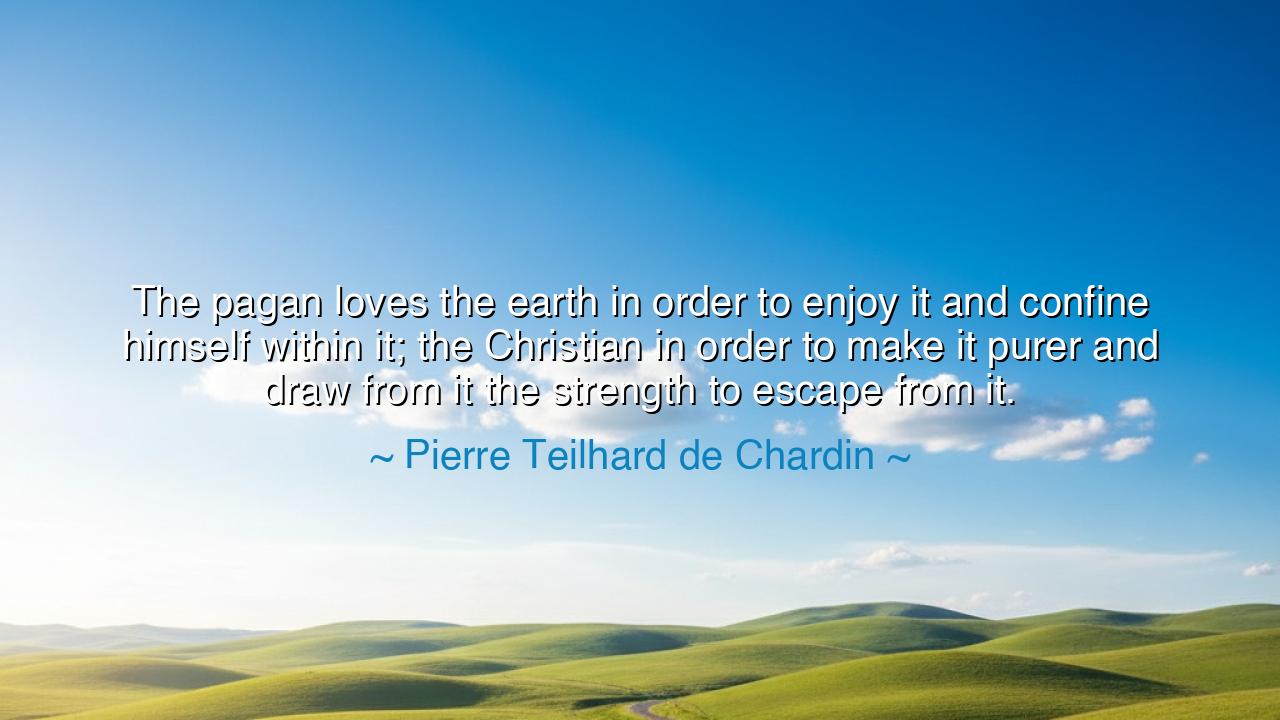
The pagan loves the earth in order to enjoy it and confine
The pagan loves the earth in order to enjoy it and confine himself within it; the Christian in order to make it purer and draw from it the strength to escape from it.






Hear the voice of the mystic, Pierre Teilhard de Chardin, who gazed upon creation and spoke these words: “The pagan loves the earth in order to enjoy it and confine himself within it; the Christian in order to make it purer and draw from it the strength to escape from it.” These words stir like ancient thunder, for they touch upon the very struggle between earth and heaven, between the delights of this world and the destiny of the soul. In them lies not contempt for the earth, but a vision of its higher purpose—a ladder for ascent rather than a prison of pleasure.
The ancients knew well the love of the earth. They offered sacrifices to rivers, to forests, to mountains, binding themselves to the rhythms of harvest and storm. To them, the world was not a path but a dwelling, not a signpost but an end. They loved the earth to be enclosed by it, to remain within its embrace. But the words of Chardin remind us that to love rightly is not to chain oneself to dust, but to lift dust into light. Enjoyment alone makes us captives; purification and transformation make us free.
Look to the life of Saint Francis of Assisi, who sang to the sun, the moon, and the creatures of the field. He loved the earth, yet not as one who would be confined by it. He kissed the leper’s wounds, tended the sparrow, and blessed the soil, not to cling to earth’s pleasures but to glimpse in them the radiance of heaven. Through such love, he drew strength not to remain but to rise. His love of the earth was not pagan delight, but Christian fire: to sanctify creation and, through it, ascend closer to God.
Consider also the fall of mighty empires. The Romans, in their later years, gave themselves over to feasting, games, and the pleasures of the flesh. They loved the earth as an end in itself, seeking its bounty to satisfy desire. But in such confinement, their strength waned, their spirit collapsed, and their empire crumbled. In contrast, the early Christians who lived under Roman rule embraced suffering, loved the earth as the garden of God, but did not cling to it. Through their vision of the eternal, they endured persecution and outlasted the empire itself. Those who live only for earth fade with earth; those who live through earth toward heaven endure forever.
The meaning of Chardin’s words is therefore clear: the true task is to engage with the earth not as an idol, but as a sacrament. The Christian does not despise soil, stone, or sea, but loves them in order to purify them, to draw from them strength for the journey toward the eternal. To touch the earth is not to be bound, but to be empowered to escape beyond it. This is the paradox of love rightly ordered: the more you sanctify what is near, the more you are freed for what is above.
The lesson for us is stern and luminous. Love the things of this world, but do not be chained by them. Enjoy them, but also transform them. Care for the earth, but let your care be an offering, a way of drawing nearer to God. Seek not merely to indulge, but to purify. The meals you eat, the labor of your hands, the beauty of fields and skies—let them be steps upon the ladder, not bars of a cage. Enjoyment without purpose imprisons; sanctification with purpose liberates.
Therefore, children of tomorrow, practice this: when you look upon the earth, see not only its pleasures but its promise. When you eat, give thanks and offer your strength to good works. When you work, let your labor purify the soil, the air, and your own spirit. When you delight in beauty, let it remind you of the greater beauty yet to come. In this way, you will not be confined within the earth but will rise from it as the eagle rises upon the wind.
Remember always: the pagan heart says, “Here is my end, my delight, my prison.” The Christian heart says, “Here is my beginning, my trial, my strength to ascend.” Thus, the love of earth becomes the path to heaven, and the fleeting beauty of dust becomes the seed of eternity. Love the earth, but love it rightly—so that through it, you may escape beyond it.






AAdministratorAdministrator
Welcome, honored guests. Please leave a comment, we will respond soon